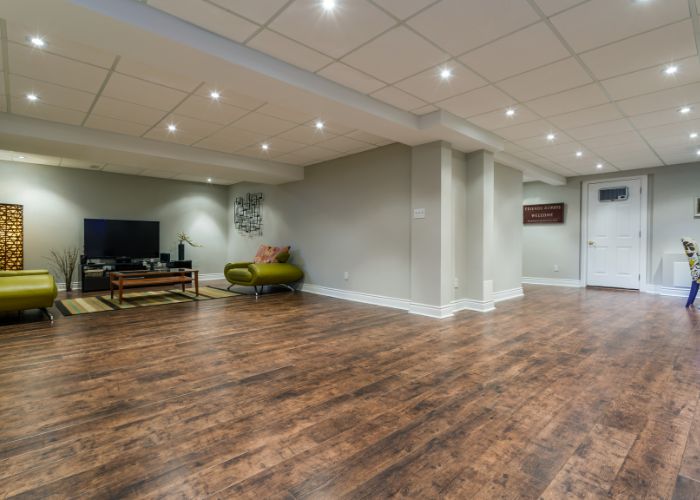When it comes to choosing basement flooring, there are a few things you need to take into account. Unlike evaluating flooring for your kitchen, in the basement we need to consider the level of moisture. But with that in mind, there are more choices today in basement flooring options than ever before. Keep reading to learn more!

If you have a damp basement, a carpet is one of the worst basement flooring options as it can mildew and rot. Laminate and vinyl plank are much better options for damp basements.
If your basement is dry, then you have a few more options. Cork flooring is a great option for basements as it is naturally mold and mildew-resistant.
Hardwood flooring is also an option, but it is important to make sure that the hardwood is sealed properly to prevent moisture damage. We’ll cover these and a few more options. Let’s go!
Laminate Flooring in Your Basement
If you’re looking for a cost-effective and easy-to-install flooring option for your basement, then laminate basement flooring may be the best of the basement flooring options for your home.
Laminate flooring is available in a wide variety of colors and styles, making it easy to find a look that will complement your existing decor. Additionally, laminate flooring is easy to clean and maintain, making it a great choice for busy households.
When installing laminate flooring in your basement, be sure to take proper precautions to prevent moisture damage. Install a vapor barrier over the concrete subfloor and use a water-resistant underlayment beneath the laminate planks.
Avoid using laminate flooring in areas where there is a potential for flooding.
If you’re looking for a durable and attractive flooring option for your basement, then laminate basement flooring may be the ideal choice for you. With proper installation and care, your laminate floors will last for many years to come.
Epoxy Basement Flooring
Most homes have basements, but many homeowners are unaware of the benefits that epoxy basement flooring can provide.
Epoxy flooring is a type of resin-based flooring that is extremely durable and easy to clean. It is also resistant to staining and fading, making it an ideal choice for basement floors. In addition, epoxy flooring can be installed quickly and easily, and it is available in a variety of colors and designs.
If you are considering epoxy basement flooring for your home, there are a few things to keep in mind.
First, make sure to choose a color that will complement the rest of your basement décor.
Second, be sure to have the flooring installed by a professional. And finally, be sure to maintain and clean your epoxy flooring properly in order to keep it looking its best.
Carpet in Your Basement
There are several benefits to carpeting your basement floor. Carpet is an effective insulator, so it will help to keep your basement warmer in the winter and cooler in the summer.
Carpet also absorbs noise, so it can make your basement a more comfortable place to spend time. In addition, carpet is relatively inexpensive and easy to install, so it is a good option for basement flooring.
If you are considering carpeting your basement floor, be sure to choose a carpet that is specifically designed for basements.
Basement carpets are usually made of durable materials that can withstand moisture and humidity. They also often have a moisture-resistant backing to prevent mold and mildew growth.
Installing carpet in your basement is a relatively easy process.
First, lay down a moisture barrier to protect your carpet from moisture. Next, staple or glue the carpet to the floor. Finally, trim the excess carpet and secure it with baseboard molding.
With proper care, your basement carpet will last for many years. Be sure to vacuum it regularly and protect it from spills by using mats or area rugs. If you do spill something on your carpet, be sure to clean it up immediately to prevent stains.
Luxury Vinyl Plank Flooring in Your Basement
If you’re looking for a durable and easy-to-install flooring option for your basement, then vinyl plank flooring is a great choice. And today’s luxury vinyl plank (LVP) is a long way from the Linoleum choices of old.
Vinyl plank flooring is made of durable PVC that can withstand high traffic and is easy to clean and maintain. Plus, vinyl plank flooring comes in a variety of colors and styles to match any decor.
Installing vinyl plank flooring in your basement is a project that you can do yourself in just a few hours. All you need is a straight edge, a utility knife, and a hammer.
First, measure the area of your basement where you want to install the vinyl plank flooring. Then, cut the vinyl plank flooring to size using the straight edge and utility knife.
Next, peel off the backing of the vinyl plank flooring and stick it to the floor. Start in one corner and work your way across the room. Once all the vinyl plank flooring is in place, use a hammer to gently tap any seams or edges that don’t seem to be sticking.
That’s it! Your new vinyl plank flooring is installed and ready to enjoy.
Cork Flooring in Your Basement
The most common type of basement flooring is cork. Cork is a great material for basement floors because it is durable, easy to clean, and comfortable to walk on.
Cork is also a good insulator, so it can help keep your basement warm in the winter and cool in the summer. If you are looking for a durable, easy-to-clean, and comfortable basement flooring option, cork is a great choice.
For installing cork basement flooring, you will need:
- Cork tiles
- Trowel
- Utility knife
- Hammer
- Nails or adhesive
- Carpenter’s square
The process:
- Begin by measuring the area of your basement that you want to cover with cork tiles.
- Cut the cork tiles to size using a utility knife.
- Apply adhesive to the back of the cork tiles, using a trowel.
- Place the cork tiles on the floor and press them into place.
- Use a hammer and nails or adhesive to secure the cork tiles to the floor.
- Use a carpenter’s square to make sure the tiles are installed evenly.
Cork basement flooring is a great option for those who are looking for an easy-to-clean and durable flooring solution. With proper installation, your cork floors will last for many years.
Hardwood Flooring in Your Basement
There are many different hardwood basement flooring options available, and each has its own advantages and disadvantages. Here is a look at the 2 options:
1. Engineered Hardwood Flooring
This type of hardwood flooring is made up of multiple layers of wood that are bonded together.
The top layer is a hardwood veneer, while the lower layers are typically made of plywood or other composite materials.
Engineered hardwood flooring is more resistant to moisture and temperature changes than solid hardwood, making it a good choice for basements. It can be installed over concrete or subfloors and is available in a variety of wood species.
2. Solid Hardwood Flooring
Solid hardwood flooring is made from a single piece of wood and is the most traditional type of hardwood flooring. It can be sanded and refinished multiple times and is available in a variety of wood species.
Solid hardwood flooring is not as moisture-resistant as engineered hardwood, so it is not recommended for basements.
Takeaway
Once you’ve considered the moisture level in your basement, you can start looking at different basement flooring options. There are many different styles and colors of flooring available, so you should be able to find something that fits your needs.
Take some time to look at all of your options before making a decision so that you can choose the best flooring for your basement.



